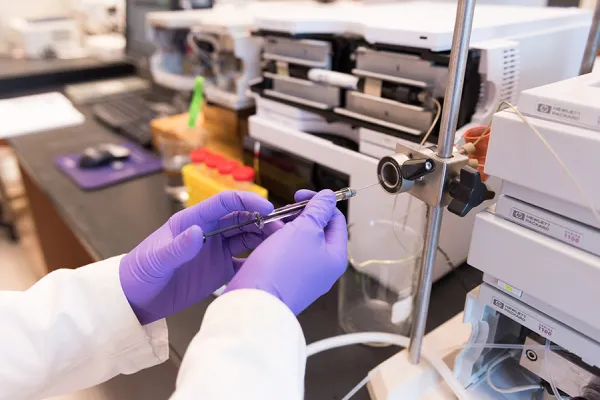AEMES Scholar Dardalie Brooks ’18 Looks at Dangers of Diet Supplements
Research & Inquiry

Published May 28, 2015
Growing up in Brooklyn, Dardalie Brooks ’18 always thought she would study medicine and become a doctor. But during her first year at Smith, she discovered she was more drawn to chemistry than biology or anatomy.
So Brooks—who is an AEMES scholar at Smith—created a research project that combined her longtime interest in health with her newfound love of chemistry.
Working with her faculty mentor Mona Kulp, a lab instructor in chemistry, Brooks launched an experiment to test for the presence of the drug sibutramine in over-the-counter weight loss supplements.
The manufacturer of sibutramine, which is used to treat obesity, voluntarily removed the substance from the market in 2010 over concerns about its association with heart attacks, high blood pressure and stroke.
Brooks’ study focused on a “slimming” product commonly found on the shelves of neighborhood grocery stores in Spanish-speaking communities. The U.S. Food and Drug Administration has issued a warning that the product contains undeclared amounts of sibutramine—a claim the manufacturer has denied.
Brooks said the results of her research show the FDA is right to be concerned. While she and Kulp have yet to quantify the precise amount of sibutramine in the slimming product, capsules purchased at a local bodega tested positive for the drug.
Brooks said she was particularly interested in analyzing weight loss products because advertising for those items is so often targeted to women.
“If you want to lose weight, you don’t need these pills,” she added. “They do more harm than good.”
Brooks was one of a dozen Smith students who presented their work at the sixth annual AEMES Research Symposium on campus earlier this spring. The college’s AEMES program, short for Achieving Excellence in Mathematics, Engineering and Sciences, offers students historically underrepresented in STEM fields mentoring, leadership and research opportunities with the goal of building a more diverse STEM community.
Smith has made significant progress toward that goal. Data collected by the Clark Science Center shows that over the last four years, the AEMES program has narrowed the performance gap in gateway science courses and helped retain students in STEM.
The science center reports that 70 percent of students of color—a group historically underrepresented in STEM—who express interest in a science major at Smith are now being retained in those majors, as opposed to only 50 percent when AEMES began in 2007.
Brooks said the AEMES program made her research possible by supporting her weekly hours in the lab and providing her with a faculty mentor.
The biggest challenge she faced in her study was finding enough pure sibutramine to analyze for comparison with diet supplement samples.
“It’s a Class 4 drug so we couldn’t get it in a solid form,” Brooks explained. “We had to use a liquid.”
Kulp said Brooks’ study involved multiple data points and chemical analysis using gas chromatography and a high-resolution mass spectrometer, which converts molecules to ions so they can be more easily separated and measured.
“Our results shows sibutramine is still out there, despite the FDA warning,” Kulp said. “It was exciting—and alarming—to get these results.”
What happens next?
Brooks plans to continue analyzing the weight loss product in the lab next fall to quantify the amount of sibutramine it contains. She and Kulp have also discussed the possibility of doing some community outreach, perhaps by distributing flyers about sibutramine in local grocery stores.
Brooks—who will spend the summer as a program assistant in the Garden Apprentice Program at the Brooklyn Botanic Garden— said her AEMES project has helped focus her interest in the sciences.
“I’m going to be a chemistry major,” she said. “I’m still really interested in the biological connection, looking at how can we use chemical compounds to help people.”
Her experience as an AEMES scholar at Smith has been “maybe even better than I expected,” Brooks added. “Seeing women in the sciences—I’m getting used to it now.”